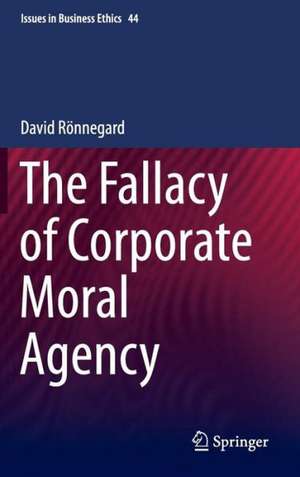The Fallacy of Corporate Moral Agency: Issues in Business Ethics, cartea 44
Autor David Rönnegarden Limba Engleză Hardback – 29 mai 2015
| Toate formatele și edițiile | Preț | Express |
|---|---|---|
| Paperback (1) | 362.43 lei 38-44 zile | |
| SPRINGER NETHERLANDS – 29 oct 2016 | 362.43 lei 38-44 zile | |
| Hardback (1) | 375.76 lei 38-44 zile | |
| SPRINGER NETHERLANDS – 29 mai 2015 | 375.76 lei 38-44 zile |
Din seria Issues in Business Ethics
- 17%
 Preț: 364.75 lei
Preț: 364.75 lei -
 Preț: 420.97 lei
Preț: 420.97 lei - 15%
 Preț: 527.48 lei
Preț: 527.48 lei - 15%
 Preț: 644.63 lei
Preț: 644.63 lei -
 Preț: 385.84 lei
Preț: 385.84 lei - 15%
 Preț: 730.86 lei
Preț: 730.86 lei - 20%
 Preț: 517.11 lei
Preț: 517.11 lei - 15%
 Preț: 598.50 lei
Preț: 598.50 lei - 15%
 Preț: 645.60 lei
Preț: 645.60 lei - 18%
 Preț: 1220.88 lei
Preț: 1220.88 lei - 18%
 Preț: 953.03 lei
Preț: 953.03 lei - 15%
 Preț: 643.99 lei
Preț: 643.99 lei - 15%
 Preț: 644.82 lei
Preț: 644.82 lei - 15%
 Preț: 639.73 lei
Preț: 639.73 lei - 15%
 Preț: 635.96 lei
Preț: 635.96 lei - 20%
 Preț: 558.33 lei
Preț: 558.33 lei - 15%
 Preț: 640.55 lei
Preț: 640.55 lei - 15%
 Preț: 644.49 lei
Preț: 644.49 lei - 18%
 Preț: 772.93 lei
Preț: 772.93 lei - 15%
 Preț: 637.59 lei
Preț: 637.59 lei - 15%
 Preț: 643.99 lei
Preț: 643.99 lei - 15%
 Preț: 644.82 lei
Preț: 644.82 lei - 15%
 Preț: 700.61 lei
Preț: 700.61 lei - 5%
 Preț: 1098.27 lei
Preț: 1098.27 lei - 15%
 Preț: 646.43 lei
Preț: 646.43 lei - 15%
 Preț: 643.99 lei
Preț: 643.99 lei - 18%
 Preț: 952.89 lei
Preț: 952.89 lei - 15%
 Preț: 641.38 lei
Preț: 641.38 lei
Preț: 375.76 lei
Nou
Puncte Express: 564
Preț estimativ în valută:
71.91€ • 74.80$ • 59.37£
71.91€ • 74.80$ • 59.37£
Carte tipărită la comandă
Livrare economică 11-17 aprilie
Preluare comenzi: 021 569.72.76
Specificații
ISBN-13: 9789401797559
ISBN-10: 9401797552
Pagini: 280
Ilustrații: XIV, 218 p. 7 illus.
Dimensiuni: 155 x 235 x 20 mm
Greutate: 0.5 kg
Ediția:2015
Editura: SPRINGER NETHERLANDS
Colecția Springer
Seria Issues in Business Ethics
Locul publicării:Dordrecht, Netherlands
ISBN-10: 9401797552
Pagini: 280
Ilustrații: XIV, 218 p. 7 illus.
Dimensiuni: 155 x 235 x 20 mm
Greutate: 0.5 kg
Ediția:2015
Editura: SPRINGER NETHERLANDS
Colecția Springer
Seria Issues in Business Ethics
Locul publicării:Dordrecht, Netherlands
Public țintă
ResearchCuprins
Introduction Part One: Corporate Moral Agency 1.1 Necessary Conditions For Moral Agency 1.2 Peter French & Corporate Moral Agency Conditions 1.3 The Structure Of Conglomerate Collectivities And Corporate Moral Agency 1.4 The Reference Of Corporate Proper Names And Responsibility Attributions 1.5 Corporate Moral Agency And Responsibility Attribution As Not Distinct From The Corporate Members 1.6 Conclusion: Legitimate And Illegitimate Corporate Moral Responsibility Attributions 2 Part Two: The Role Of The Corporation In Society 2.1 Descriptively: The Role Of The Corporation In Society 2.2 Prescriptively: The Role Of The Corporation In Society Conclusion Bibliography.
Recenzii
“Anyone interested in the questions of corporate moral and social obligations will find a great deal of value in Fallacy. Among other things, it provides an excellent survey of the many theories of corporate moral agency … . Fallacy is an interesting, useful addition to both the corporate moral responsibility and the corporate social responsibility literatures, and raises a number of issues that will need to be addressed as those literatures continue to develop.” (Kendy M. Hess, Business Ethics Quarterly, Vol. 26 (4), October, 2016)
Textul de pe ultima copertă
It is uncontroversial that corporations are legal agents that can be held legally responsible, but can corporations also be moral agents that are morally responsible? Part one of this book explicates the most prominent theories of corporate moral agency and provides a detailed debunking of why corporate moral agency is a fallacy. This implies that talk of corporate moral responsibilities, beyond the mere metaphorical, is essentially meaningless. Part two takes the fallacy of corporate moral agency as its premise and spells out its implications. It shows how prominent normative theories within Corporate Social Responsibility, such as Stakeholder Theory and Social Contract Theory, rest on an implicit assumption of corporate moral agency. In this metaphysical respect such theories are untenable. In order to provide a more robust metaphysical foundation for corporations the book explicates the development of the corporate legal form in the US and UK, which displays how the corporation has come to have its current legal attributes. This historical evolution shows that the corporation is a legal fiction created by the state in order to serve both public and private goals. The normative implication for corporate accountability is that citizens of democratic states ought to primarily make calls for legal enactments in order to hold the corporate legal instruments accountable to their preferences.
Caracteristici
The first book to focus exclusively on Corporate Moral Agency and its implications Provides a broad context for the analysis of corporate social responsibility, covering the disciplines of philosophy, economics and law Offers a contrarian perspective in a field that largely endorses corporate moral agency and corporate social responsibility Provides reasoned arguments in favor of a legal perspective
















